England v New Zealand: What is it like to face the haka?
- Published
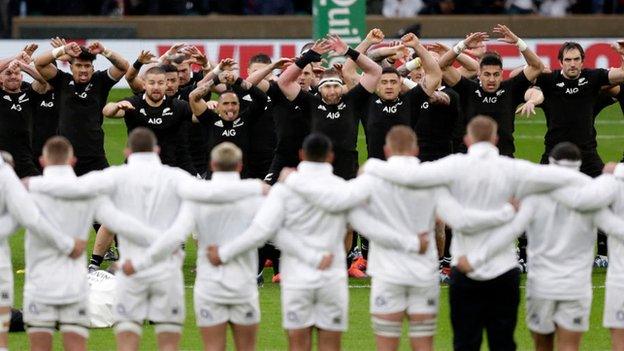
England last faced the haka in November when they were on the wrong end of a 16-15 scoreline at Twickenham
Rugby World Cup semi-final: England v New Zealand |
|---|
Venue: International Stadium, Yokohama Date: Saturday, 26 October Kick-off: 09:00 BST |
Coverage: Full commentary on BBC Radio 5 Live, plus text updates on the BBC Sport website and app. |
"It is life! It is life! It is death! It is death!"
It is certainly one of the most thrilling pieces of pomp and ceremony in sport.
New Zealand's haka - a Maori cultural challenge that includes those lines and is laid down before every match the All Blacks play - tingles spines of television viewers worldwide.
But what is it like to be the focus of a haka, staring back at one of the most dominant teams in world sport in full cry?
Former England back row James Haskell, who retired from rugby at the end of last season, played against New Zealand six times in his 77-cap Test career.
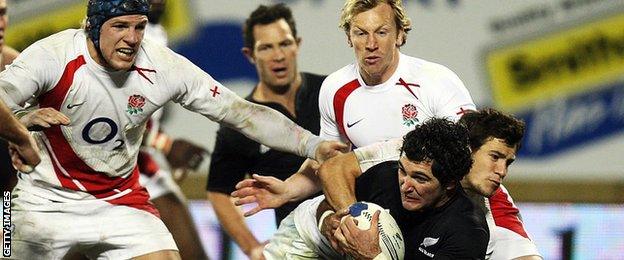
Haskell, standing left, first played against New Zealand in June 2008, aged 23. England lost 37-20 in Auckland
"The haka makes me want to play," he told BBC Hereford & Worcester. "I used to listen to recordings of it before Premiership games because it used to motivate me so much.
"Any decent professional finds it massively motivating. It doesn't strike any fear in anybody's mind.
"It is only armchair pundits and fans who believe that it does that. To be honest, it just makes you want to fly into them.
"There is a huge psychological battle around New Zealand - people spend too much time trying to play like them, talking about them, too much time focusing on them.
"This England side will spend all this week focusing on themselves and that is rule number one."
World Rugby, who organise the Rugby World Cup and govern the global game, has set rules about how teams face the haka, keeping the two sets of players at least 10 metres apart.
Before that safe space was introduced, several teams decided to accept the All Blacks challenge in person.
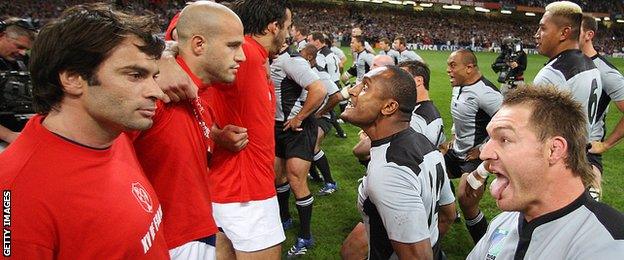
The France squad were clad in red, white and blue t-shirts, representing their Tricolore flag, before their 2007 World Cup meeting with the All Blacks
Perhaps most famously, France, with Thierry Dusautoir and Sebastien Chabal to the fore, advanced on the haka before sensationally knocking the favourites out of the 2007 World Cup in the quarter-finals.
The tactic is no guarantee of success though.
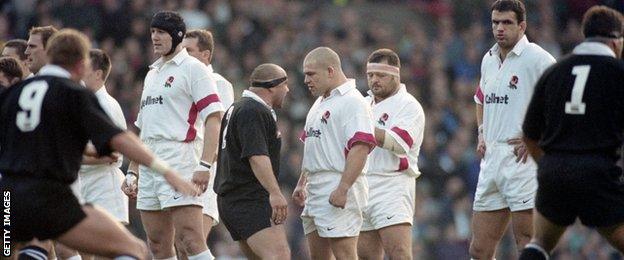
Richard Cockerill was making only his second start for England
In 1997, England hooker Richard Cockerill went nose to nose with opposite number Norm Hewitt at Old Trafford. Eight years earlier Ireland captain Willie Anderson drew roars from Lansdowne Road after leading his team's advance on the haka.
On both occasions, New Zealand ran out comfortable winners.
In 2006, the Welsh Rugby Union informed its New Zealand counterparts six weeks before the teams' November meeting that it planned to use the Welsh national anthem - Hen Wlad fy Nhadau - as a response to the haka.
New Zealand opposed that order of ceremonies and, with neither side backing down, the All Blacks performed the haka in their changing room before winning 45-10., external
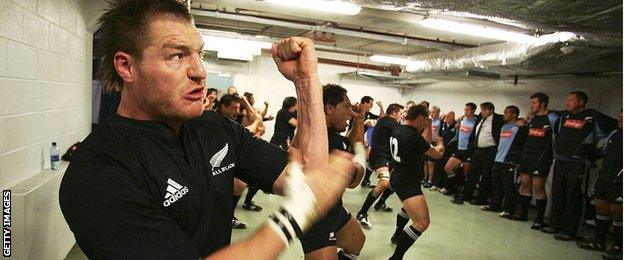
Ali Williams and his team-mates perform their haka away from the Cardiff crowd in 2006
There was not much more backing down two years later in Cardiff when Wales responded to the haka by staring back at the All Blacks and refusing to turn away. It took referee Jonathan Kaplan more than 45 seconds to convince the two teams to retreat for kick-off.
Before claiming their first win over the All Blacks in Chicago in 2016, Ireland lined up in a figure of eight to pay their own tribute to Munster head coach and former Ireland back row Anthony Foley who had died at the age of 42 the previous month.
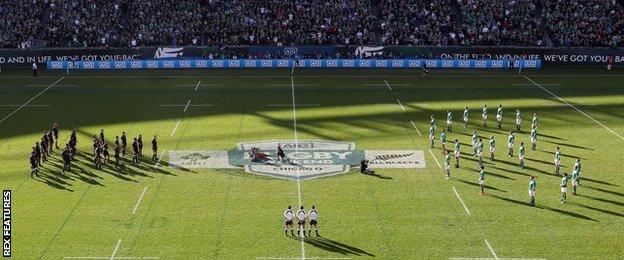
Various players have made their own individual gestures to the haka.
In 2005, British and Irish Lions captain Brian O'Driscoll, having apparently taken advice from a Maori elder about the most appropriate way to accept the challenge, picked a blade of grass and held it aloft in the wake of New Zealand's first-Test haka.
However, it has been suggested that by then tossing away the grass, he committed a cultural faux pas. O'Driscoll suffered a dislocated shoulder inside the first minute of the match in an off-ball, unseen, spear tackle by an unrepentant Tana Umaga and Keven Mealamu.
There was no doubting Sam Scott-Young's disdain in 1992. The Australia back row blew kisses and winked at the New Zealand front row before a Bledisloe Cup Test and needed 26 stitches for a head injury sustained in the match.
The year before, in a Rugby World Cup semi-final, team-mate David Campese had opted not to face New Zealand's haka at all, instead practising his kicking at one end of the pitch. The wing duly scored a try in a 16-6 victory.